- Home
- Jonathan Stroud
Lockwood & Co.: The Creeping Shadow Page 2
Lockwood & Co.: The Creeping Shadow Read online
Page 2
Or at least, nothing natural did. But my inner ear caught a gentle cracking noise close by, like glass shards being trodden underfoot.
The woman had been stabbed to death with broken glass. My stomach twisted, but I kept my voice upbeat. “Anything in those mirrors?” I said. I shoved at the panel again.
“No, you’re good. All’s clear.” That was Dave, his tone flat with tension.
“It’s getting colder,” Ted said. “Getting colder really fast.”
“Okay.” Yes, I could feel the temperature draining away; the wood was freezing to the touch. I struck the panel with cold and sweaty fingers, and this time felt it move.
Glass crunched.
“She’s coming back, pulling herself out of the past,” the skull said. “She doesn’t like you being here.”
“Someone’s weeping,” Tina said.
I’d heard it, too: a desolate, angry sound, echoing in a lonely place. And with it came the rustling of approaching linen—sodden fabric, wet with blood….
“Watch those mirrors, everyone,” I ordered. “Keep talking to me….”
“All’s clear.”
“Getting colder…”
“She’s very near.”
I shoved again, harder—and this time it was enough. The piece of wood swung in—and out seesawed a narrow door: a section of paneling cracking free of the wall, wreathed in cobwebs and trailing dust.
Beyond it? Only darkness.
I wiped the sweat from my face; both hand and brow were freezing. “There we are,” I said. “As promised—one secret room! Now all we need to do is go inside.”
I turned back to the others, gave them all a beaming smile—
—And looked into their mirrors.
There was my pale face, reflected three times. And close behind it, another face, its skin melting off the bone. I saw pale hair like clouds; I saw bared teeth as small and red as pomegranate seeds. I saw the black and glinting eyes; and last, in the split second I had left, the five clawed fingers reaching for my throat.
We all reacted, in our different, self-defining ways. Tina screamed and dropped her mirror; Ted leaped back like a scalded cat. Only Dave held his mirror firm—or firmish—while he scrabbled for something at his belt. Me? Before Tina’s mirror had shattered on the floor, I’d reversed my rapier and driven it behind me. Wheeling around, I stared into emptiness. But smoke rose from the middle of my sword, and a worm of ectoplasm writhed and fizzed on the iron blade.
I slashed the rapier frantically to and fro. Then I did it some more.
“Waste of time,” the skull said, after a pause. “She’s gone back inside the wall.”
“Why didn’t you tell me that right away? I hit her. How badly did I hit her?”
“It was hard to see, what with your immense display of raw skill blocking my view.”
“Well, where—?” But at that point I was blown sideways by a blast of salt, iron, and white magnesium fire that erupted from the wall a few feet to the left. For a second the room shone bright as day; it was like we’d been dropped into the sun. Then the flames drew back, and darkness closed in, and I was lying in a bed of ash and glowing cinders, with my ears ringing and my hair over my eyes.
I got stiffly to my feet, tapping at my ear, supporting myself with my sword. Through the smoke I could see Ted and Tina goggling at me from a far corner of the room. Close by, Dave was crouched like a small, squat panther, a second magnesium flare ready in his hand.
“Did I get it?”
I patted down a small white flame licking from my sleeve. “No, Dave. No, you didn’t. But it was a very good try. And you don’t need to chuck another one. She’s gone into the secret room.” I coughed out a glob of ash. “We have to follow her and finish this. We—Yes, Ted?” From his corner, Ted had raised a hand.
“You’ve got a trickle of blood coming from your nose.”
“I know.” I dabbed at it with a sleeve. “But thanks for pointing it out. Right, we need to go in. Who’s coming with me?”
The three of them might have been carved from stone. Their fear was so solid it was like a fifth person in the room. They stared at the opening in the wall. I waited while wreaths of smoke spread and mingled, filling the office, blocking them from my sight.
“Mr. Farnaby says—” Ted’s voice began.
“Like I care what Farnaby says!” I cried. “He’s not in here! He’s not risking his life with us! Think for yourselves for once!”
I waited. No answer came. Rage and impatience filled me. I turned alone to the secret door.
I could still feel the wave of cold following the ghost like a bridal train, running away into the dark. The side of the bureau shone with nets of ice crystals, as delicate as lacework. The paneling was frosted over, too. I flicked on my flashlight.
It was a narrow passage, wooled with cobwebs, bending almost immediately to the left and out of sight. Darkness hung there, and also a faint tart tang, the smell of dust and death.
Somewhere inside was the Source of the haunting, the place or object to which the ghost was tied. Suppress that by covering it with silver or iron and you trapped the Visitor, too. Simple. I took my mirror in one hand, my flashlight and rapier in the other, and squeezed into the hole.
It wasn’t something I wanted to do, exactly. I could have waited for the others; I could have spent ten minutes cajoling them to follow me. But then I might have lost my nerve as well. Once in a while you have to be a little reckless; that’s a skill I learned somewhere.
The passage was so narrow I brushed against brick on either side, the cobwebs tearing off as I passed through. I went slowly, steeling myself for an ambush.
“Do you see her?” I whispered.
“No. She’s tricky; flicks in and out of this world. Makes her hard to pin down.”
“I wonder what the Source is, what she’s guarding.”
“Some bit of her, more than likely. Maybe the husband got overenthusiastic, hacked her into pieces. A toe rolled off, say, went under a chair, and got lost. Easily done.”
“Why do I ever listen to you? That’s so disgusting.”
“Hey, there’s nothing disgusting about random body parts,” the skull said. “I’m one myself. It’s an honest profession. Steady here—blind turn.”
Darkness bled around the corner. I took a salt-bomb from my belt and chucked it ahead of me, out of sight. I heard it burst, but there was no psychic impact—I hadn’t hit anything.
I raised my flashlight and peered around. “Maybe she wants us to find it,” I muttered. “That’s a possibility, isn’t it? It’s almost like she’s showing us where to look.”
“Maybe. Or luring you to a miserable death. I reckon that’s an option, too.”
Either way, we didn’t have far to go. The concentration of spiders—always a sign of Visitors—told me that. Ahead was a little room, choked with a thousand cobwebs; they were strung from wall to wall, fireplace to ceiling. Over and through each other they passed, forming a maze of soft gray hammocks and lumpy, dust-encrusted intersections. My flashlight beam was fractured, split, and inexplicably absorbed. I was inside a bird’s nest of maddening distortions. Tiny black-bellied bodies moved on the fringes, scuttling to find shelter from the light.
I hesitated, letting my eyes make sense of the confusion. The place was a former dressing room, I guessed, sealed behind the fake panel; remnants of tattered wallpaper backed this up. One wall had rows of empty shelves, another a small brick fireplace, with a skeleton of a bird lying amid the sooty rubble. There was no window. Black dust washed in dead, dry waves against the sides of my boots. The room had been shut up for a long time.
I listened; somewhere close I heard a woman weeping.
A tall, gold-rimmed dressing table mirror stood against one wall. Its pane of glass was smashed; dust caked the few remaining shards.
When I’d first looked around the corner, I’d sensed—just for an instant—a faint gray shape standing before the mirror, bent slightly,
as if looking in. But the apparition, if such it was, had instantly vanished, and I was left to cut my way through the cobwebs with my rapier, scowling as they stuck to hand and blade. The mirror was cocooned like some giant fly.
In the story, Emma Marchment had been stabbed with glass from her mirror. The looking glass might be the Source. I opened one of the pouches at my belt, shook free its silver chain net, and draped it over the top of the mirror. I listened again. The weeping noise continued; the feeling of wrongness in the room remained.
“No…” I said. “Pity…” I was turning my gaze slowly around the room. The mirror…the fireplace…the empty shelves. The cobwebs were a nightmare; in places, visibility was down to nothing. I cursed the Rotwell group softly. “It’s so hard,” I muttered, “doing this on my own.”
“What?” A shrill voice of protest echoed from my backpack. “Who are you talking to, if you’re ‘on your own’? Let’s have some accuracy here.”
I rolled my eyes. “Sorry. Scratch that. Aside from an evil talking skull imprisoned in a dirty old jar and carried around out of a perverse sense of pity, I’m on my own. That makes a world of difference.”
“How can you say that? We’re pals, you and me.”
“We are so not pals. You’ve tried to get me killed dozens of times.”
“I’m dead, too, remember. Maybe I’m lonely. Ever think of that?”
“Well, keep a close watch now,” I ordered. “I don’t want her leaping out at me.”
“Yeah, a kiss from old jawless would be a bit messy,” the skull said. “Mind you, she’s not the worst we’ve come across. That must’ve been that Raw-bones in Dulwich. Remember its moaning? ‘I want my skin! I want my skin!’ Yeah, yeah, so you’ve lost it! Tough! Get over it!” The skull chuckled to itself, then stopped abruptly. “Oh, wait, hold on a second—you’re not trying that, are you? Lucy, Lucy…it never ends well.”
Which was only partly true. One of my Talents, along with Sight (fair) and Listening (better than anyone I’d worked with), was Touch—a variable and frustrating gift, which often gave me nothing (or too little), and sometimes far too much. In recent months, its accuracy had noticeably improved, and it was worth a try here. I stretched out my hand to the mirror and touched a fragment of remaining glass. Closing my mind to the present, I opened it to the past, inviting the object to loop me back to long ago.
As so often these days, the sounds came swiftly, and with them, dim images….The weeping noise faded, to be replaced by the pop and crackle of burning logs. I shut my eyes, saw the same room, but now it was filled with color and variety—as different from its modern incarnation as a living body is from bones. A fire flickered in the hearth; the shelves gleamed with jars and pots and leather-bound books. On a table, piles of herbs lay scattered, together with other, bloodier things.
A lady with long dark hair stood by the hearth, her dress stained red by firelight, the lace fringes of her sleeves rippling in the currents of warm air. She was doing something to the chimney, adjusting the position of a broad, thin stone. As my gaze alighted on her, she froze. Her head turned, and she glared across at me; it was a look of such malignant possessiveness that I recoiled. My shoulder bumped against the wall behind me, and I was back in the present, in the dark, cold empty shell of the little room.
“You took your sweet time,” the skull said.
I rubbed my eyes. To me it had been a fleeting instant. “How long was I gone?”
“I hankered for a newspaper and slippers, I was that bored. Find anything?”
“Maybe.” I flicked my flashlight beam onto the black hole of the fireplace. A little higher up, scarcely visible under its patina of dirt, was that broad, thin stone.
I still have it. That’s what the ghost of Emma Marchment had said.
Still in there. Her special thing.
I took my crowbar from my belt. In two steps I was at the stone, prying and scraping at its edge. It wasn’t the nicest thing in the world, turning my back on that cobwebby room, but there was no alternative. Years of black soot had filled the gaps around it, and the stone was hard to move. I wished I was stronger. I wished I was part of a proper team. Then I’d have had someone to stand behind me, guard my back, and watch the shadows. But I didn’t have that luxury.
“Speed it up. A mouse could pull that pebble out.”
“I’m trying.”
“I could do better, and I don’t have hands. Put some beef into it, woman.”
My only answer was a muttered curse. I had the crowbar wedged in, and the stone was moving, but the weeping noise was getting louder, and once again I could hear the soft tread of footsteps on broken glass. I looked around. Ice was spreading along the cobwebs in the room.
“She’s coming,” I said. “I’d prefer insights to insults at this stage.”
“Oh, with me you get the full package. This is a tight spot, Lucy. Why don’t you set me free? I’d put you out of your misery then.”
“I bet you would. I’ve almost got it….Just keep watch.”
“You want me to tell you when she’s creeping close?”
“No! Before that!”
“When her fingers are closing around your neck?”
“Just tell me when she’s in the room.”
“Too late for that. She’s here.”
The hairs on the back of my neck did that thing they always do when I’m no longer alone. I took one hand off the crowbar, picked up the mirror dangling at my belt, and angled it over my shoulder. The chamber was black, but a faint gleam shone in the center of the glass. It was the chilly blue glint of other-light, cast by a stick-thin figure, drifting toward me through the dark.
It was at this point I remembered I’d left the silver net draped over the looking glass on the far side of the room.
Desperation gave me strength. I dropped the mirror, plucked a salt-bomb from my belt, and threw. It burst and scattered. There was a smell of burned ectoplasm. The falling granules of salt picked out a woman’s form in tumbling, burning green. The shape became two snake-like strands that split and darted away. The salt burned out, and darkness fell again. I launched myself onto the crowbar and heaved; the stone came free. I danced aside as it dropped to the ground. Where was my flashlight? There, lying in the fireplace. I snatched it up, angled it into the shallow recess left behind the stone.
Inside: a large dark object, like an irregular-shaped soccer ball, heavily spun with cobwebs, and with spiders crawling on its surface. It was furry with dust and age.
“Oh,” I said. “A head.”
“Yep. Old. Mummified. Nice.”
“But not her head.”
“Nope. Or if it is, there’s another good reason her husband killed her: she had a beard.”
Even under the cobwebs you could see the wiry black tufts sprouting from the chin.
I picked up the head. Yeah, yeah, I know. It’s the sort of thing we have to do.
“Where is she, skull?”
“The apparition has re-formed. Now she’s standing by the mirror. Ooh, there are cobwebs running through her wounds. That’s weird. Now she’s moving forward. She’s not happy you’ve got her Source—she has her hands stretched out….”
I could have thrown a flare, I guess, but there was nowhere for me to hide from the concussion. I could have used the rapier, but I couldn’t have held that and the mirror and the Source all at the same time. So I did what I’d learned to do, back when I’d worked with proper agents. I improvised.
I threw the head away from me across the room. I felt the wave of cold shift sideways, saw cobwebs ice over as the ghost moved instinctively after it. At the same moment I sprang the other way, over to the looking glass, where I seized the silver net, and spun around. I snatched up my hand mirror just in time to see the ghost turn back to me. There was a whole host of horrid details on show right then—you could take your pick of which was worse, the ravaged, bloody body or the deranged wickedness in the face—but I took no notice of any of them. I was doing
the matador routine that Lockwood had taught me long ago, feinting with the silver net, darting in and out, keeping the Specter at bay. All at once I let my guard down, stood unprotected. The ghost surged forward, fingers raking; as it did so, I twisted aside and, with a flick of the arm, tossed the net directly into the face of the apparition.
Silver did what it always does: the ghost shimmered and went out.
I picked up the net again, bent down to the head, lying on its side against the wall, and covered it with the silver. Something popped in my ears; the feeling of immanent evil in the room burst and was gone.
I spoke in the general direction of my backpack. “How’s that?”
“Not bad, I grant you.”
I sank to the floor, and regarded the bundle at my feet. “This is some Source. Whose head do you think it is? And why did she want it?”
“She’ll have picked it up at a gallows, most likely. That was the usual way witches did it, back in the old days—to aid them in whatever useless spells they were attempting.”
“Ugh. That is so foul.”
“Yeah…” The skull left a significant pause. “Hanging out with a severed head…What kind of sick person would do something like that?”
“I know.” I sat there in the dark of the secret room until my breathing returned to normal and my heart stilled. Then I got stiffly to my feet, swaddled the head securely in the silver net, and went to find the others. I didn’t exactly hurry. The dangerous part of the night was over, but the worst bit was just beginning.
You might think that finding the head was the end of the matter. Ghost gone, Source suppressed, another building made safe—everything done and dusted. But no. Because we now come to the main drawback of being a freelance psychic detection agent: reporting to the adults at the end.
This was the central paradox of the agencies. Only children and teenagers had decent psychic Talent, so operatives were young. We were the ones who dealt with ghosts; we were the ones who risked our lives. Yet it was the grown-ups who ran the show. They called the shots, they paid the salaries; they were in charge of all the teams. The adult supervisors had zero psychic sensitivity and, since they were mortally afraid of going anywhere near an actual Visitor, never ventured far into a haunted zone. Instead, they hung around on the sidelines, being old and useless, and shouting orders that were utterly out of sync with whatever was going on.

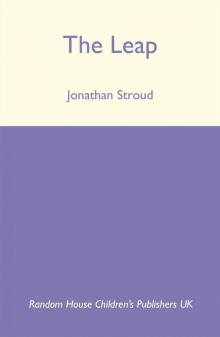 The Leap
The Leap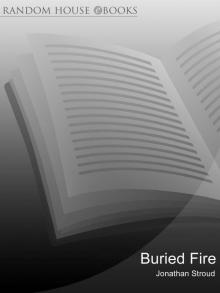 Buried Fire
Buried Fire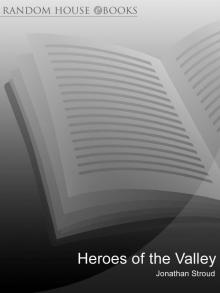 Heroes of the Valley
Heroes of the Valley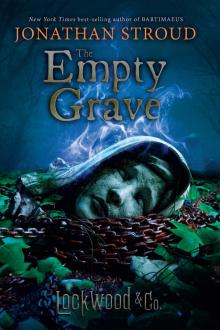 The Empty Grave
The Empty Grave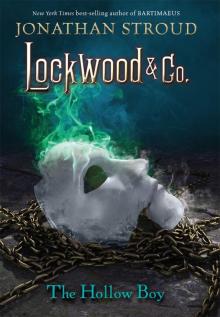 The Hollow Boy
The Hollow Boy The Last Siege
The Last Siege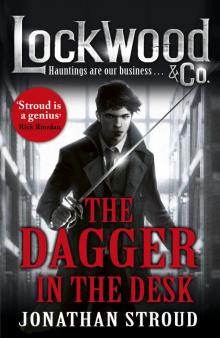 The Dagger in the Desk
The Dagger in the Desk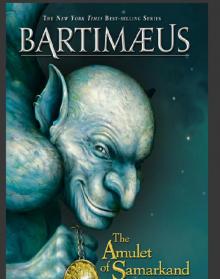 The Amulet of Samarkand
The Amulet of Samarkand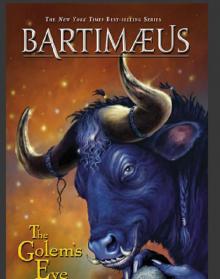 The Golem's Eye
The Golem's Eye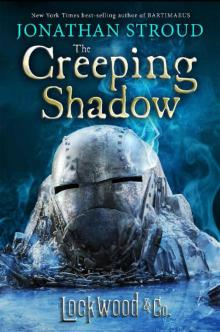 The Screaming Staircase
The Screaming Staircase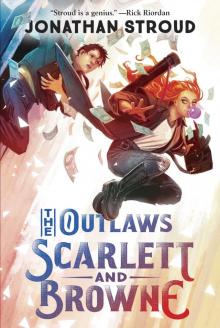 The Outlaws Scarlett and Browne
The Outlaws Scarlett and Browne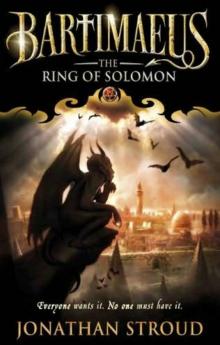 The Ring of Solomon: A Bartimaeus Novel
The Ring of Solomon: A Bartimaeus Novel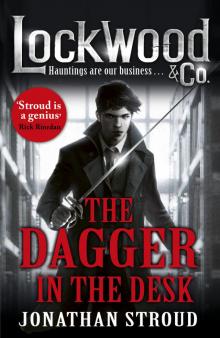 Lockwood & Co
Lockwood & Co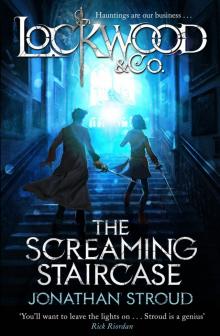 Lockwood & Co: The Screaming Staircase
Lockwood & Co: The Screaming Staircase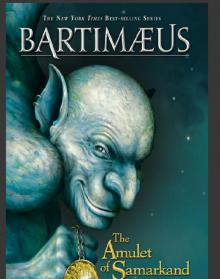 Bartimaeus: The Amulet of Samarkand
Bartimaeus: The Amulet of Samarkand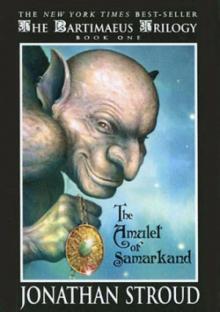 The Amulet of Samarkand tbt-1
The Amulet of Samarkand tbt-1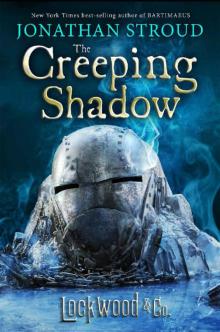 Lockwood & Co.: The Creeping Shadow
Lockwood & Co.: The Creeping Shadow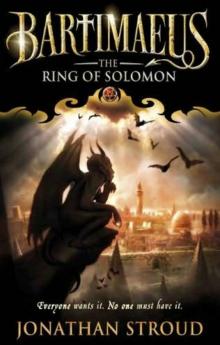 The Ring of Solomon
The Ring of Solomon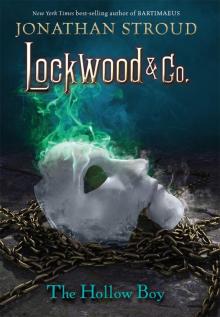 Lockwood & Co. Book Three: The Hollow Boy
Lockwood & Co. Book Three: The Hollow Boy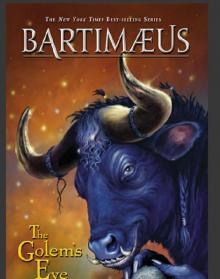 Bartimaeus: The Golem’s Eye
Bartimaeus: The Golem’s Eye